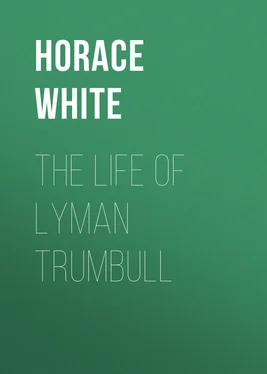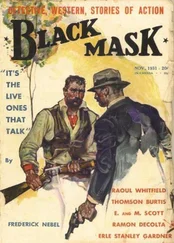Horace White - The Life of Lyman Trumbull
Здесь есть возможность читать онлайн «Horace White - The Life of Lyman Trumbull» — ознакомительный отрывок электронной книги совершенно бесплатно, а после прочтения отрывка купить полную версию. В некоторых случаях можно слушать аудио, скачать через торрент в формате fb2 и присутствует краткое содержание. Жанр: foreign_prose, История, foreign_edu, foreign_antique, на английском языке. Описание произведения, (предисловие) а так же отзывы посетителей доступны на портале библиотеки ЛибКат.
- Название:The Life of Lyman Trumbull
- Автор:
- Жанр:
- Год:неизвестен
- ISBN:нет данных
- Рейтинг книги:5 / 5. Голосов: 1
-
Избранное:Добавить в избранное
- Отзывы:
-
Ваша оценка:
- 100
- 1
- 2
- 3
- 4
- 5
The Life of Lyman Trumbull: краткое содержание, описание и аннотация
Предлагаем к чтению аннотацию, описание, краткое содержание или предисловие (зависит от того, что написал сам автор книги «The Life of Lyman Trumbull»). Если вы не нашли необходимую информацию о книге — напишите в комментариях, мы постараемся отыскать её.
The Life of Lyman Trumbull — читать онлайн ознакомительный отрывок
Ниже представлен текст книги, разбитый по страницам. Система сохранения места последней прочитанной страницы, позволяет с удобством читать онлайн бесплатно книгу «The Life of Lyman Trumbull», без необходимости каждый раз заново искать на чём Вы остановились. Поставьте закладку, и сможете в любой момент перейти на страницу, на которой закончили чтение.
Интервал:
Закладка:
In 1842, a colored woman named Sarah Borders, with three children, who was held under the indenture law by one Andrew Borders in Randolph County, escaped and made her way north as far as Peoria County. She and her children were there arrested and confined in a jail as fugitive slaves. They were brought before a justice of the peace, who decided that they were illegally detained and were entitled to their freedom. An appeal was taken by Borders to the county court, which reversed the action of the justice. The case eventually went to the supreme court, where Lyman Trumbull and Gustave Koerner appeared for the negro woman in December, 1843, and argued that slavery was unlawful in Illinois and had been so ever since the enactment of the Ordinance of 1787. The court decided against them. 14 14 Negro Servitude in Illinois , by N. Dwight Harris, p. 108.
Trumbull was not discouraged by the decision in this case. Shortly afterward he appeared before the supreme court again in the case of Jarrot vs. Jarrot, in which he won a victory which practically put an end to slavery in the state. Joseph Jarrot, a negro, sued his mistress, Julia Jarrot, for wages, alleging that he had been held in servitude contrary to law. The plaintiff's grandmother had been the slave of a Frenchman in the Illinois country before it passed under the jurisdiction of the United States. His mother and himself had passed by descent to Julia Jarrot, nobody objecting. Fifty-seven years had elapsed since the passage of the Ordinance of 1787 and twenty-six since the adoption of the state constitution, both of which had prohibited slavery in Illinois. The previous decisions in the court of last resort had generally sustained the claims of the owners of slaves held under the French régime and their descendants, and also those held under the so-called indenture system. Now, however, the court swept away the whole basis of slavery in the state, of whatever kind or description, declaring, as Trumbull had previously contended, that the Congress of the Confederation had full power to pass the Ordinance of 1787, that no person born since that date could be held as a slave in Illinois, and that any slave brought into the state by his master, or with the master's consent, since that date became at once free. It followed that such persons could sue and recover wages for labor performed under compulsion, as Joseph Jarrot did.
This decision, which abolished slavery in Illinois de facto , was received with great satisfaction by the substantial and sober-minded citizens. Although the number of aggressive anti-slavery men in the state was small and of out-and-out abolitionists still smaller, there was a widespread belief that the lingering snaky presence of the institution was a menace to the public peace and a blot upon the fair fame of the state, and that it ought to be expunged once for all. The growth of public opinion was undoubtedly potent in the minds of the judges, but the untiring activity of the leading advocates in the cases of Borders, Jarrot, etc., should not be overlooked. On this subject Mr. Dwight Harris, in the book already cited, says:
The period of greatest struggle and of greatest triumph for the anti-slavery advocates was that from 1840 to 1845. The contest during these five years was serious and stubbornly carried on. It involved talent, ingenuity, determination, and perseverance on both sides. The abolitionists are to be accredited with stirring up considerable interest over the state in some of the cases. Southern sympathizers and the holders of indentured servants in the southern portion of the state were naturally considerably concerned in the decisions of the supreme court. Still there seems to have been no widespread interest or universal agitation in the state over this contest in the courts. It was carried on chiefly through the benevolence of a comparatively small number of citizens who were actuated by a firm belief in the evils of slavery; while the brunt of the fray fell to a few able and devoted lawyers.
Among these were G. T. M. Davis, of Alton, Nathaniel Niles, of Belleville, Gustave Koerner, of Belleville, and Lyman Trumbull. James H. Collins, a noted abolition lawyer of Chicago, should also be highly praised for his work in the Lovejoy and Willard cases, but to the other men the real victory is to be ascribed. They were the most powerful friends of the negro, and lived where their assistance could be readily secured. They told the negroes repeatedly that they were free, urged them to leave their masters, and fought their cases in the lower courts time and time again, often without fees or remuneration. Chief among them was Lyman Trumbull, whose name should be written large in anti-slavery annals.
He was a lawyer of rare intellectual endowments, and of great ability. He had few equals before the bar in his day. In politics he was an old-time Democrat, with no leanings toward abolitionism, but possessing an honest desire to see justice done the negro in Illinois. It was a thankless task, in those days of prejudice and bitter partisan feelings, to assume the rôle of defender of the indentured slaves. It was not often unattended with great risk to one's person, as well as to one's reputation and business. But Trumbull did not hesitate to undertake the task, thankless, discouraging, unremunerative as it was, and to his zeal, courage, and perseverance, as well as to his ability, is to be ascribed the ultimate success of the appeal to the supreme court.
This disinterested and able effort, made in all sincerity of purpose, and void of all appearance of self-elevation, rendered him justly popular throughout the State, as well as in the region of his home. The people of his district showed their approval of his work and their confidence in his integrity by electing him judge of the supreme court in 1848, and Congressman from the Eighth District of Illinois by a handsome majority in 1854, when it was well known that he was opposed to the Kansas-Nebraska Bill.
CHAPTER III
FIRST ELECTION AS SENATOR
The repeal of the Missouri Compromise was the cause of Trumbull's return to an active participation in politics. The prime mover in that disastrous adventure was Stephen A. Douglas, who had been Trumbull's predecessor in the office of secretary of state and also one of his predecessors on the supreme bench. He was now a Senator of the United States, and a man of world-wide celebrity. Born at Brandon, Vermont, in 1813, he had lost his father before he was a year old. His mother removed with him to Canandaigua, New York, where he attended an academy and read law to some extent in the office of a local practitioner. At the age of twenty, he set out for the West to seek his fortune, and he found the beginnings of it at Winchester, Illinois, where he taught school for a living and continued to study law, as Trumbull was doing at the same time at Greenville, Georgia. He was admitted to the bar in 1834. In 1835, he was elected state's attorney. Two years later he was elected a member of the legislature by the Democrats of Morgan County, and resigned the office he then held in order to take the new one. In 1837, he was appointed by President Van Buren register of the land office at Springfield. In the same year he was nominated for Congress in the Springfield district before he had reached the legal age, but was defeated by the Whig candidate, John T. Stuart, by 35 votes in a total poll of 36,742. 15 15 The Journal of the Illinois State Historical Society for October, 1912, contains an autobiography of Stephen A. Douglas, of fifteen pages, dated September, 1838, which was recently found in his own handwriting by his son, Hon. Robert M. Douglas, of North Carolina. It terminates just before his first campaign for Congress.
In 1840, he was appointed secretary of state, and in 1841, elected a judge of the supreme court under the circumstances already mentioned. In 1843, he was elected to the lower house of Congress and was reëlected twice, but before taking his seat the third time he was chosen by the legislature, in 1846, Senator of the United States for the term beginning March 4, 1847, and was reëlected in 1852. In Congress he had taken an active part in the annexation of Texas, in the war with Mexico, in the Oregon Boundary dispute, and in the Land Grant for the Illinois Central Railway. In the Senate he held the position of Chairman of the Committee on Territories.
Интервал:
Закладка:
Похожие книги на «The Life of Lyman Trumbull»
Представляем Вашему вниманию похожие книги на «The Life of Lyman Trumbull» списком для выбора. Мы отобрали схожую по названию и смыслу литературу в надежде предоставить читателям больше вариантов отыскать новые, интересные, ещё непрочитанные произведения.
Обсуждение, отзывы о книге «The Life of Lyman Trumbull» и просто собственные мнения читателей. Оставьте ваши комментарии, напишите, что Вы думаете о произведении, его смысле или главных героях. Укажите что конкретно понравилось, а что нет, и почему Вы так считаете.












